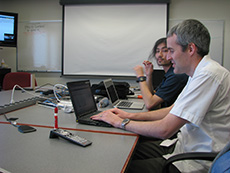Masterclasses make mentors out of Fermilab scientists
 |
Fermilab scientists Teppei Katori and Jake Anderson participate in a QuarkNet masterclass videoconference. Photo: Sarah Khan
|
"Can we claim the discovery of a new particle with this data?" asked Fermilab scientist Jake Anderson recently to 35 high-school students at the University of Rochester on the other end of a videoconference.
The students said they would need more trials to make such a claim, referring to a mass spectrum plot they recently created with real CMS data. Anderson then talked about the number of trials CMS scientists needed while narrowing the search for the Higgs boson.
The videoconference is part of an ongoing series of QuarkNet masterclasses in which high-school students from around the world can analyze particle physics data and discuss results with scientists working on the same projects.
Fifty videoconferences will be held this year. Most are at CERN, but about a quarter are at Fermilab, where both Fermilab and Argonne National Laboratory physicists volunteer as moderators.
Anderson is one of several moderators participating in the series. His job is to ask questions that get students to interpret the meaning of their data and results. Anderson asks what certain numbers mean, why there are peaks in the data and what's going on with all the extraneous information in between.
Anderson said he isn't unfamiliar with reaching out to young, aspiring scientists.
"I have always enjoyed participating in outreach, so when I heard about the masterclasses I immediately signed up," Anderson said.
Anderson used to take outreach trips to elementary schools while studying physics as an undergraduate and gave tours of SLAC National Accelerator Laboratory, in addition to pursuing graduate studies. He said that casual conversations about his job as a physicist sometimes start with others remarking that math and science has always been "too difficult."
"I'd just like to show (students) that science doesn't have to be difficult and onerous like it's often perceived," Anderson said.
Additionally, masterclasses show young physics students what it's like to work and live as a physicist. Students at the recent masterclass asked Anderson and MIT postdoc Teppei Katori about working far away from the universities they attend.
It's not uncommon to travel thousands of miles or more from your university campus, they explain.
"We want to give them a sense of collaboration in particle physics," said Ken Cecire, a QuarkNet staff teacher at Notre Dame University. "Scientists come from all over the world to do research at a lab. They go where the science is."
—Sarah Khan
|